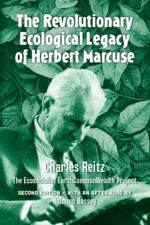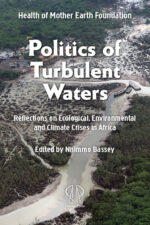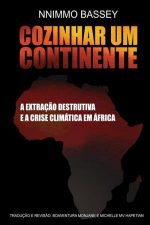 Nnimmo Bassey is a Nigerian environmental justice activist, architect, essayist and poet. He is the director of the ecological think-tank, Health of Mother Earth Foundation (HOMEF) and coordinator of Oilwatch International. He was the chair of Friends of the Earth International (the largest grassroots environmental organisation in the world) from 2008-2012 as well as the co-founder and executive director of Environmental Rights Action (1993-2013) which is based in Nigeria (in Benin city, Lagos, Abuja, Port Harcourt and Yenagoa).
Nnimmo Bassey is a Nigerian environmental justice activist, architect, essayist and poet. He is the director of the ecological think-tank, Health of Mother Earth Foundation (HOMEF) and coordinator of Oilwatch International. He was the chair of Friends of the Earth International (the largest grassroots environmental organisation in the world) from 2008-2012 as well as the co-founder and executive director of Environmental Rights Action (1993-2013) which is based in Nigeria (in Benin city, Lagos, Abuja, Port Harcourt and Yenagoa).
He was a co-recipient of the 2010 Right Livelihood Award also known as the “Alternative Nobel Prize.” In 2012 he received the Rafto Human Rights Award and in 2014 he was awarded Nigeria’s national honour as a Member of the Federal Republic (MFR) in recognition of his environmental activism.
Nnimmo Bassey is the author of the highly acclaimed book, To Cook a Continent, which details the destructive impacts of the extractive industries and the climate crises in Africa. He has also authored books on architecture. His poetry focuses on environmental justice. ‘We thought it was oil but it was blood’ and ‘I will not dance to your beat’, are two of his most widely known books of poems.
-
I see the invisible
USD $ 5.00 USD $ 20.00Price range: USD $ 5.00 through USD $ 20.00Select options This product has multiple variants. The options may be chosen on the product pageI see the invisible
USD $ 5.00 USD $ 20.00Price range: USD $ 5.00 through USD $ 20.00Truth be told, I never thought I would write another volume of poetry after the last, I will not Dance to Your Beat (2011). The reason was that my previous volumes were reactive to the circumstances of the times. Patriots and Cockroaches (1992) was a reaction to the socio-political corruption that had engulfed Africa and dimmed the enthusiasm that had been built by the years of struggle for independence. Whereas we thought we were stepping into a post-colonial era, what we stepped into was a vicious neo-colonial times. The next collection, Poems on the Run (1995) was a reaction to military autocracy and the repression that followed. The volume was literally written underground. This was followed by Intercepted (1998) all written while detained at Kalakuta Republic of Alagbon Close. We Thought it was Oil But it was Blood (2002) responded to two things primarily – extractivism and the accompanying human and environmental rights abuses in the Niger Delta and elsewhere. The massive erosion of biodiversity and attacks on food sovereignty through the introduction of genetically modified organisms (GMOs) into our agricultural system inspired I Will not Dance to your Beat.
What you have in your hands, or on your screens, is a compilation that is largely more meditative than the previous collections. There are moments of reflection on the colonial and neoliberal foundations that permit a willful disconnection from nature and the resultant destructive extractivism.
Some of the poems came through conversations and poetry writing sessions with Peter Molnar, Maryam al-Khawaja — Rafto Human Rights laureates and Salil Tripathi, a member of the board of PEN International, in August 2017. The sessions held at a beautifully rustic location in Celleno, Italy, were documented on celluloid by the duo of Maria Galliana Dyrvik and Anita Jonsterhaug Vedå of SMAU, a multimedia firm in Norway. Poetic relationship with Maria and Anita has continued over the years and their work continues to inspire more and more poems.
Select options This product has multiple variants. The options may be chosen on the product page -
Oil Politics
USD $ 1.00 USD $ 25.00Price range: USD $ 1.00 through USD $ 25.00Select options This product has multiple variants. The options may be chosen on the product pageOil Politics
USD $ 1.00 USD $ 25.00Price range: USD $ 1.00 through USD $ 25.00The essays here contribute to developing and deepening an understanding of the ecological challenges ravaging Nigeria, Africa and our world today. They illustrate the global nature of these terrors. These essays are not meant just to enable for coffee table chatter: they are intended as calls to action, as a means of encouraging others facing similar threats to share their experiences.
Set out in seven sections, this book of 54 essays deals with deep ecological changes taking place primarily in Nigeria but with clear linkages to changes elsewhere in the world. The essays are laid out with an undergird of concerns that characterise the author’s approach to human rights and environmental justice advocacy. The first section rightly presents broad spectrum ecological wars manifesting through disappearing trees, spreading desertification, floods, gas flaring and false climate solutions.
Select options This product has multiple variants. The options may be chosen on the product page -
Cozinhar Um Continente: A Extração Destrutiva e a Crise Climática na África
USD $ 25.99Críticas da obra:
“Uma provocante crítica à extração contemporânea dos recursos (talvez mais adequadamente, “exploração” dos recursos) na África Subsariana. Na sua convincente análise, e em momentos abrasadora, Bassey apresenta uma critica cativante e abrangente da crise social e ambiental que se vive na África” – Chatham House
“De escravos a diamantes e passando pelo petróleo, há muito que os países mais consumistas têm vindo a pilhar a África a seu bel-prazer. Bassey explica muito bem como tudo isso tem vindo a acontecer, frisando bem o que procura a África: Justiça. Leia a obra e junte-se ao apelo de Bassey” – Annie Leonard, autora d´A estória das coisas
“Um livro que explica, de forma perspicaz e eloquente, o que a África pode fazer para travar as novas formas de colonização exacerbadas pelo caos das mudanças climáticas” – Pablo Solon, ex-embaixador da Bolívia nas Nações Unidas
“É uma obra que, a par da forte denúncia que faz da ganância e do saque da riqueza africana, apresenta perspetivas de esperança” – Camilla Toulmin, presidente do Instituto Internacional de Desenvolvimento e Meio Ambiente
“A África e o seu ambiente. Com um estilo refrescante, o autor torna as suas ideias extremamente acessíveis. Um dos mais proeminentes ambientalistas da África, faz uma análise abrangente dos desafios que enfrenta o continente, inspirando as pessoas a agir.” – David Fig, Presidente da Biowatch South Africa e autor do Staking Their Claims
“Para aqueles que ainda estão sépticos dos efeitos das mudanças climáticas, este livro vai deixa-los não apenas incomodados e preocupados, mas também motiva-los a fazer alguma coisa” – Nigerian CompassO nigeriano Nnimmo Bassey é arquiteto, ativista ambiental e escritor. Foi presidente dos Amigos da Terra Internacional (Friends of the Earth International) de 2008 a 2012 e Diretor Executivo da Ação pelos Direitos Ambientais (Environmental Rights Action) durante duas décadas. Em 2009, foi nomeado “Herói do Ambiente” pela revista Time e, em 2010, foi co-vencedor do prestigiado Right Livelihood Award (considerado o Prémio Nobel Alternativo). Em 2012, ganhou o Rafto Prize. É atualmente diretor da Fundação Health of Mother Earth, uma organização ambientalista de reflexão e advocacia.
-
PAS DE REDD EN AFRIQUE
USD $ 10.00La présente publication du Réseau Pas de REDD en Afrique (No REDD in Africa Network) a pour but de démystifier le REDD, les projets de type REDD et toutes leurs variantes, et de montrer ce qu’ils sont vraiment : des mécanismes injustes conçus pour lancer une nouvelle phase de colonisation du continent africain. Les exemples présentés démontrent clairement que le REDD est une escroquerie et que les pollueurs savent qu’il leur permet d’acheter le « droit » de polluer.
-
Stop the Continent Grab and the REDD-ification of Africa
So-called Reducing Emissions from Deforestation and Forest Degradation (REDD) is emerging as a new form of colonialism and economic subjugation. This book shows how these unjust mechanisms were designed to usher in a new phase of colonization through an invasion of genetically modified crops and trees which threatens to take over entire ecosystems.








